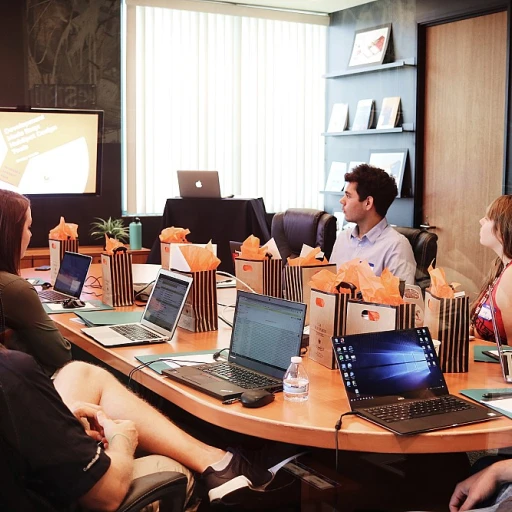
Understanding Rapid Skill Acquisition
Unpacking the Dynamics of Rapid Skill Acquisition
In today's fast-paced world, the ability to master new skills quickly is more valuable than ever. Rapid skill acquisition is not just about speed; it's about understanding the learning process and optimizing it for efficiency. This approach involves a strategic combination of science-backed techniques and a beginner mindset that embraces challenges and learning.
To effectively acquire skills at a rapid pace, it's crucial to engage in deliberate practice. This involves focused, structured practice sessions that target specific areas for improvement. The concept of spaced repetition is also integral, as it helps reinforce knowledge over time, ensuring that learning is retained and not forgotten.
Another powerful tool in this process is elaborative interrogation, a technique that involves questioning and explaining concepts to deepen understanding. Coupled with the Feynman Technique, where learners explain topics in simple terms, these methods help fill gaps in knowledge and strengthen comprehension.
Incorporating skill stacking—the combination of complementary skills—can also enhance one's ability to learn rapidly. By building a diverse set of skills, learners can create a unique skill set that sets them apart in their field.
It's important to manage expectations and set realistic goals. While the idea of rapid skill acquisition is appealing, progress can vary based on the complexity of the skill and the learner's prior experience. Embracing a growth mindset, as emphasized in various books on developing an abundance mindset, is crucial for maintaining motivation and resilience.
As we delve deeper into this topic, we'll explore how mentorship plays a pivotal role in skill development and the strategies that can be employed to overcome challenges in the learning journey.
The Role of Mentorship in Skill Development
The Transformative Influence of Mentorship in Skill Progress
Mentorship plays a pivotal role in the skill development process, offering invaluable guidance as learners navigate the landscape of rapid skill acquisition. At the core, mentorship provides learners with practical insights and tailored support, which can significantly accelerate the learning process. This can be seen as a form of "elaborative interrogation," where mentors challenge learners to deepen their understanding of new concepts, filling knowledge gaps through deliberate practice.
One potent mentoring strategy is introducing learners to the "beginner mindset." This approach encourages them to embrace the initial challenges of acquiring new skills by focusing on progress rather than immediate perfection. This mindset, combined with the science of rapid skill acquisition, allows for more effective skill stacking where learners build complementary skills that enhance overall capability.
Mentors also guide learners through the process of managing realistic expectations. This framework helps prevent burnout by setting objectives that are both challenging and attainable. By advocating for techniques like "spaced repetition," mentors help learners retain knowledge over the long term, ensuring skills are not just learned, but mastered.
A critical element in this dynamic is "interleaved practice," a technique that fosters better skill retention by mixing related but distinct skills in practice sessions. Mentors can guide the learners in integrating this into their practice regime, creating a more robust skill acquisition process. Furthermore, the "feynman technique" can be introduced as a powerful tool, encouraging learners to teach what they've learned, thereby solidifying their understanding and identifying areas for improvement.
Mentorship doesn't only focus on technical skills but also hones the right "mindset" for tackling challenges. By cultivating a strong, informed, and adaptable approach to learning, mentors assist in developing skills at a high level, equipping individuals not just with knowledge, but with the capability to apply it effectively in real-world scenarios.
For learners seeking structured growth and qualification, exploring mentorship opportunities might align well with strategies discussed in "group mindset training with certificate," which can further enhance professional development.
Strategies for Effective Mentoring
Creating an Impactful Learning Environment
Mentoring is a powerful catalyst in skill development, but not all mentorships are equally beneficial. Effective mentoring requires a strategic approach to ensure rapid skill acquisition and mastery. Here's a look into some strategies that can help mentors and mentees maximize the potential of their relationship.
Fostering an Open and Supportive Atmosphere
An open and supportive environment encourages learners to experiment, ask questions, and embrace challenges. It is essential to create a space where mentees feel comfortable discussing their thoughts and progress while also challenging them to stretch their capabilities.
Emphasizing Deliberate Practice
Deliberate practice is crucial in the learning process for rapid skill acquisition. By focusing on targeted practice sessions, learners can hone specific skills effectively. Mentors should guide mentees in identifying areas that require more practice and foster a mindset geared towards continuous improvement.
Implementing the Feynman Technique
This technique involves teaching the concept back, which helps learners solidify their understanding of complex topics. By breaking down complex concepts into simpler terms, mentees can reinforce their knowledge and pinpoint areas that need further clarification.
Encouraging Interleaved Practice
- Switch between multiple skills or topics during practice to promote adaptability and a deeper understanding of the material.
- Use elaborative interrogation by asking 'why' questions to deepen comprehension and cultivate a more profound grasp of interconnected concepts.
Setting Realistic Expectations
Managing expectations is essential for both mentors and mentees. Establishing realistic goals and milestones ensures that progress is evident and celebrated. Being realistic also involves recognizing that the learning process is not always linear, and setbacks are part of the journey.
For those navigating the mentorship journey, exploring professional mentoring insights can further enhance understanding and application of effective strategies in diverse learning settings.
Overcoming Challenges in Skill Acquisition
Facing and Conquering Roadblocks in Learning
While embarking on the journey of learning new skills, one often encounters various roadblocks. The process of skill acquisition isn't always linear, and learners must be prepared to face and conquer these challenges to succeed. Here are some common obstacles and strategies to overcome them.
Nurturing a Growth Mindset
Adopting a growth mindset is crucial when beginning the learning process. This mindset enhances one's ability to accommodate changes and thrive in challenging situations. With this perspective, hurdles become opportunities for growth rather than insurmountable barriers.
Engaging in Deliberate Practice
Deliberate practice is essential to progress in any skill. This approach involves focused and intentional practice sessions rather than mindlessly repeating a task. Encourage the use of techniques such as interleaved practice and spaced repetition to ensure learning is effective and robust.
Breaking Down Complex Concepts
Understanding intricate concepts can be daunting, especially for beginner learners. By breaking down complex skills into smaller, manageable segments, the learning process becomes more manageable. Use the Feynman technique to explain concepts in simple terms, thus solidifying knowledge.
Building Complementary Skills
Skill stacking, or combining complementary skills, can remove many obstacles in the process of skill development. Integrating new skills with existing ones not only enriches knowledge but often simplifies the learning experience, paving the way for rapid skill acquisition.
Managing Realistic Expectations
Maintaining realistic expectations is vital in any learning endeavor. Setting achievable goals helps learners stay motivated and persevere despite difficulties. By managing expectations, learners avoid the discouragement that often comes with slow initial progress.
The journey of mastering a new skill is filled with challenges, but with a strategic approach, these obstacles can be effectively addressed for successful skill development.
Measuring Success in Skill Acquisition
Evaluating and Celebrating Progress
Measuring success in skill acquisition is as much about celebrating progress as it is about reaching milestones. Riding the wave of enthusiasm requires an understanding of the learning process and setting realistic expectations. As the learning skill journey unfolds, it is critical to keep learners motivated and engaged.- Set Milestones and Celebrate Achievements: Creating clear benchmarks allows learners to measure their progress, reducing the overwhelming nature of learning new concepts. Celebrating these accomplishments, no matter how small, injects enthusiasm and a sense of achievement into the skill development process.
- Embrace the Beginner Mindset: Having the courage to approach learning with openness helps in breaking down complex ideas into manageable parts. This beginner mindset fosters growth and enjoyment in the journey of skill acquisition, a central theme throughout various chapters of deliberate practice.
- Utilize Effective Learning Techniques: Techniques like spaced repetition and interleaved practice strengthen the retention of knowledge. These science-backed approaches help in embedding new skills more robustly, allowing for rapid skill absorption.
- Adopt the Feynman Technique: By explaining a concept as if tutoring a fellow learner, one strengthens understanding and identifies knowledge gaps. This method fills understanding voids and solidifies concepts that may initially seem elusive.
- Feedback Loops and Self-Reflection: Regular feedback and self-assessment are invaluable. They provide insight into one’s progression and highlight areas for improvement, making the learning approach more efficient and targeted.
- Analyze and Adapt: Flexibility in approach enhances learning. When a particular method of practice or strategy fails to yield the desired outcomes, adapt an alternative that might cater better to individual needs.
Real-Life Case Studies
Practical Examples of Skill Mastery Through Mentorship
When it comes to rapid skill acquisition, nothing speaks louder than real-life case studies where individuals have succeeded in mastering new skills through effective mentorship. These stories not only inspire but also serve as a testament to the principles explored in the realms of learning process and skill development.
One popular method is the deliberate practice approach where a committed learner dedicates themselves to repeated practice sessions focused on refining specific aspects of their skill. This technique, often emphasized in the science of skill acquisition, involves a systematic process of setting high-level goals and gradually building up the necessary complementary skills for mastery.
In particular, the incorporation of techniques such as spaced repetition and interleaved practice can significantly enhance the effectiveness of learning. These methods allow learners to fill knowledge gaps, reinforce concepts, and manage expectations with a realistic mindset, ensuring steady progress towards rapid skill acquisition.
Another effective strategy involves using the Feynman Technique, which emphasizes the importance of teaching a concept to someone else as a way to deeply understand it. This reinforces the learning and solidifies the learner's knowledge base, facilitating skill stacking and fortifying the mind against potential challenges.
Mentorship plays a critical role in these scenarios, as mentors guide learners through the complexities of the skill development process. By sharing their insights and expertise, mentors enable mentees to navigate learning hurdles, establish a beginner mindset, and adopt effective strategies like elaborative interrogation.
While skill acquisition can indeed be rapid, it’s important to maintain realistic expectations throughout the journey. The progress indicates that a combination of deliberate practice, guidance from experienced mentors, and a commitment to learning new skills in a structured manner can pave the way for remarkable professional growth and competency.













